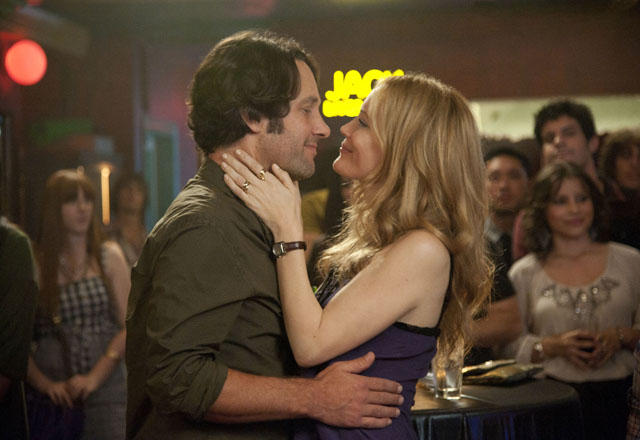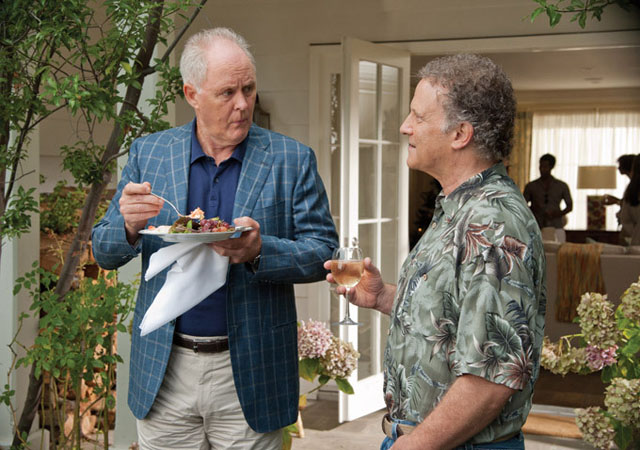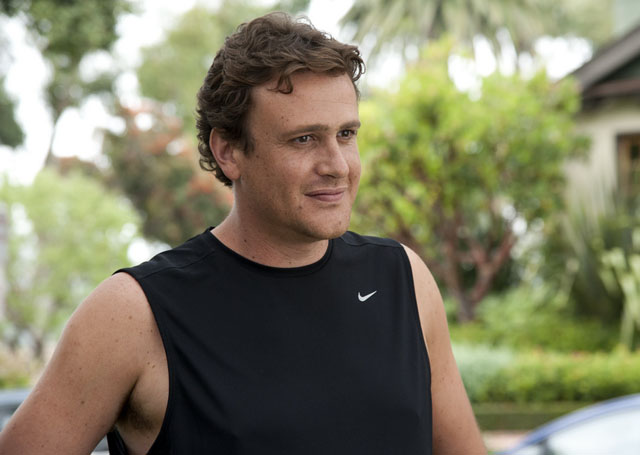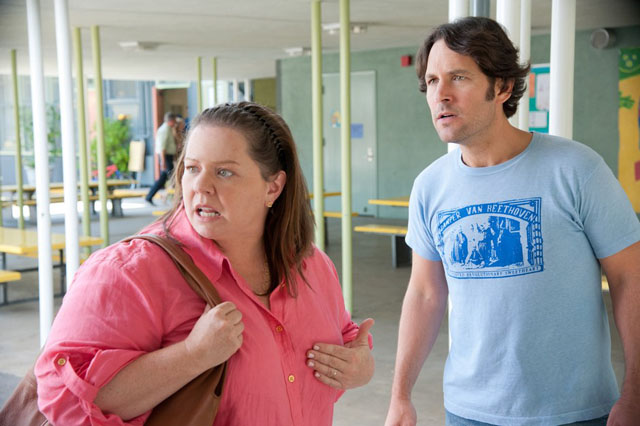By David Hudson
“Judd Apatow’s instincts have rarely been sharper, wiser or more relatable than in This Is 40, an acutely perceptive, emotionally generous laffer about the joys and frustrations of marriage and middle age,” begins Justin Chang in Variety. “Boasting the empathy, texture and underlying seriousness that have characterized the filmmaker’s output, this warts-and-all family portrait is anchored by splendid turns from Paul Rudd and Leslie Mann, reprising their already full-bodied supporting roles from Knocked Up…. Apatow’s house style is by now so well known, his imprimatur such a fixture of the mainstream comedy landscape, that it’s startling to remember that This Is 40 is only his fourth feature as a writer-director. It also happens to be his most fully realized: Less high-concept than Funny People, Knocked Up or the similarly titled The 40-Year-Old Virgin, Apatow’s script simply charts the progress of everyday family life over the course of an eventful three-week period, in which Debbie (Mann) and longtime husband Pete (Rudd) both kiss their 30s goodbye.”
But for the Hollywood Reporter‘s Todd McCarthy, This Is 40 “is a two-hour wobble between the honestly funny and the downright unbearable. Truth be told, there is more that’s hard to take in the first half and more hilarity in the second, which is a good thing, but it remains unclear whether the filmmaker would recognize the difference between the two. Using the three female members of his immediate family in leading roles opposite Paul Rudd as his alter ego, the most productive comic filmmaker of the past several years serves up a goulash of autobiography, confessional, self-psychoanalysis, marriage counseling, midlife angst, anatomical pranks, well-oiled shtick and far too many scenes that calculatedly end with obscene kickers.”
Jordan Hoffman at Film.com: “To put it in terms Paul Rudd’s character Pete would understand, This is 40 is to Judd Apatow what Sandinista! is to The Clash. It is overblown and unwieldy and has more than its share of misfires. It also has moments of absolute perfection that will have a universal and timeless resonance. Most importantly, it is a pure, maximalist representation of a gifted artist simultaneously at the top of his game and looking to expand the form. The form, let’s face it, is the sitcom. Most of This is 40‘s gargantuan running time is spent at the very upper-middle class (and product placement-heavy) home of Pete (a troubled record executive) and Debbie, Sadie and Charlotte, played, if you didn’t know, by Apatow’s wife and daughters…. The problem with This is 40, and there is indeed one, is the low to no stakes in the film. Try as I might, I couldn’t get too worked about the looming, secret crisis—that the family might have to sell their house…. However—and this is key—it doesn’t really matter. It’s Apatow’s life and it’s his film.”
Earlier this month, for Film Comment, Scott Foundas spoke with Apatow, “who makes confessional comedies that edge ever more towards tragedy, who exalts reality over escapism, and who seems scarcely persuaded by the industrial demands for name stars, ‘high’ concepts, and audience ‘pre-awareness.'” In Knocked Up, “Pete and Debbie were offered up as something of a model couple… trying to steer Debbie’s pregnant sister Alison (Katherine Heigl) and her stoner boyfriend Ben (Seth Rogen) along the right path. Here, five years on, Apatow gives us Pete and Debbie on the doorstep of the big 4-0, wondering if they’ve scored more wins than losses, and where they might go from here. Indeed, where can they go in light of an imploding economy that threatens to take down Pete’s indie record label, Debbie’s struggling small business and their over-mortgaged house in one fell swoop? And how to cope with parents they no longer recognize—her father (John Lithgow) long estranged, his (Albert Brooks) remarried with in vitro triplets he can’t tell apart—and kids who seem to be growing up much too fast?”
Last August, Dave Itzkoff visited the set for the New York Times and found that it “can sometimes feel like a day care center for children and adults alike.” Then, in September he spoke with the director “at the West Los Angeles office his employees call the Apatower, [where] he said: ‘Here’s my family, here’s my marriage, here’s my job. Are we happy with where we’re at? Can we make it better?’ The comedy in that, he said, arises ‘when you try really hard to control it all, and that always comes back and smacks you in the face.'”
Viewing (69’11”). Conan O’Brien engages Apatow in some “Serious Jibber-Jabber.”
Update, 12/2: Abby Aguirre profiles Rudd for the NYT.
Update, 12/3: “Welcome to the world of white people problems, ground zero for the strain of American comedies that Apatow does best,” writes Indiewire‘s Eric Kohn. “But does he really?… At a certain point…, Apatow’s stardom gave him the authority to inject more of his personality into his storytelling, and the legacy overtook his capacity for nuanced humor. The bloated dramedy Funny People was an aggressively pompous look at stand-up comedians’ dark lives, while This is 40 comes across as a full-fledged work of narcissism—a two hour-plus studio comedy about the Apatow broods’ ordinary crises with no reason for its heft other than the director’s popularity.”
Updates, 12/10: “Rudd’s reclaimed his ’90s haircut, and Mann now speaks in a baby voice and sneaks cigarettes like a high school freshman,” notes Amy Nicholson at Box Office. “Worse, they fight like pouty preteens, which means halfway through this so-called comedy, we’re rooting for their divorce, or really, their outright death.”
“There are enough effective moments—comic and sometimes dramatic—to keep the film moving pleasantly along, but the rambling feel might in the end make this one of Apatow’s more middling box office performers,” predicts John Hazelton in Screen.
Meantime, Apatow has edited the first comedy issue of Vanity Fair. There are three separate “all-star” covers, and Slate‘s David Haglund finds the whole package to be pretty “terrific.”
Apatow’s also a guest on Fresh Air.
Update, 12/12: Viewing. Anne Thompson talks with Apatow about the film as well as about working with Lena Dunham and Vanity Fair.
Update, 12/15: “At its best,” writes Slate‘s Dana Stevens, “This Is 40 feels like a strung-together series of ideas for a movie, or maybe a television show—though individual scenes can make you laugh, fleetingly, the whole appears to have been constructed without any thought to shaping a narrative arc. At its worst, This Is 40 feels like being condemned to watch two hours of someone else’s home movies—overly long, self-indulgent, and bone-crushingly banal.”
Update, 12/16: “Countless people working from a foundation of narcissism have produced great art, tempering that fixation with self-realization and wit,” writes Jesse Cataldo in Slant. “But the problem with This Is 40 is one that, to varying degrees, has plagued all of Apatow’s directorial efforts: the tendency toward navel-gazing, as well as the lazy and self-congratulatory presentation, with an inclination toward gags that reference the chosen milieu without actually attempting to capture, document, or enliven it.”
Updates, 12/23: “When Paul Rudd declared midway through Knocked Up that marriage was like a ‘tense, unfunny episode of Everybody Loves Raymond,’ it was meant as a warning to a friend,” writes Adam Nayman for Cinema Scope. “As it turns out, he was also offering an advance review of This Is 40…. A friend’s sarcastic suggestion that This Is 40 could be a prequel of sorts to Michael Haneke‘s Amour isn’t so far off target considering the desperate, co-dependent cruelty of its central couple.” And “while we know what’s wrong with Pete and Debbie, we’re also cued from the get-go that it’s nothing a few methodically doled-out life lessons can’t fix. The potentially unsettling elements are all safely contained within Apatow’s sitcom sensibility; the obstacles he keeps dropping in Pete and Debbie’s way are either easily surmounted (an Iranian couple wants to buy their house for more than it’s worth) or adroitly sidestepped altogether. The absolutely vicious tenor of their big mid-film blow-out fight—the scene that has led certain easily impressed parties to invoke John Cassavetes—lingers in the mind not because it’s especially powerful but because there’s nothing in the back half of the film that satisfactorily addresses either characters’ qualms.”
“Rudd’s performance, as well as his character, emphasizes the double nature of the movie,” suggests the New Yorker‘s Richard Brody. “On the one hand, it’s a kind of wild-souled existential drama, Bergmanesque in its building of confrontations on the excavated sediment of painful backstory; Cassavetes-like (think of one of the Husbands) in its suburban ethnic flailing. On the other hand, it is a bouncy, chirpy-toned, pop-culture-centric, amiable, and uproarious comedy of family foibles, with upper bounds on idiosyncrasy and lower bounds on darkness. It’s really two movies in one, and its very doubleness suggests Apatow’s own multiple ambitions—and their possible conflicts.”
“In the smallness of its drama, in its anthropological fascination with the logistics of the bourgeois household, This is 40 is a natural next step in Apatow’s progression toward an increasingly narrow self-inspection.” But Laura Bennett, writing for the New Republic, finds that “in his quest to share this inner world, he has strayed from what made The 40 Year Old Virgin and Knocked Up so good: a commitment to absurdity that goes beyond domestic scenes peppered with outrageously dirty jokes. Take Andy’s (Steve Carell) obsession with meticulously painting tiny toy soldiers in The 40 Year Old Virgin, or the general ludicrousness of Seth Rogen’s gang of pothead cronies in Knocked Up. These movies—along with Freaks and Geeks and Superbad, two of Apatow’s greatest producing credits—unpack weird, specific worlds and develop them fully, rather than relying on familiar trappings of suburban life as props.”
But in the New York Times, A.O. Scott suggests “that the movie’s ability to foresee—even to welcome—a hostile or indifferent response counts in its favor. This Is 40 is an intensely, at times embarrassingly, personal film, by a man who has worked hard, lucked out and wants to share some of his happiness and its attendant worries with the rest of us.”
More from Henry Barnes (Guardian, 2/5), Ty Burr (Boston Globe, 2.5/4), David Denby (New Yorker), Robert Horton (Herald), Glenn Kenny (MSN Movies, 3.5/5), Noel Murray (AV Club, B+), Mary Pols (Time), Ray Pride (Newcity Film), Eric D. Snider (Twitch), Scott Tobias (NPR), Alison Willmore (Movieline, 6.5/10), and Scott Wilson (Nashville Scene).
Interviews with Apatow and/or Mann and/or Rudd: Cory Everett (Playlist), Drew McWeeney (HitFix, more), Drew Taylor (Playlist), Scott Tobias (AV Club), and Jen Yamato (Movieline).
Update, 12/26: “Paul Rudd plays likable everymen with such skill that, in classic movie-star fashion, it’s easy to forget just how much variation he brings to parts that might otherwise default to stock,” writes Jesse Hassenger in the L. “Even putting aside his talent for buffoonery (Wet Hot American Summer, Anchorman), Rudd has impressive comic range, modulating his persona for the withering sarcasm of Role Models, the needy dorkiness of I Love You, Man, the earnest bumbling of How Do You Know, the stoned affability of Our Idiot Brother, or the uptight yuppiedom of Wanderlust.” In the case of This Is 40, “it’s safe to say that Rudd serves as the filmmaker’s surrogate. At first glance, it’s a flattering substitution: as he enters his 40s, Rudd remains an impossibly charming, good-looking guy. But even with these qualities in place, Apatow doesn’t allow much glorifying. Quite the opposite: he writes Pete as a little meaner, a little weaker, a little more self-centered than you might think—and Rudd, ever game, obliges.”
Updates, 12/30: Writing for the New Yorker, Meghan Daum argues that “the collectivist overtones of a title like This Is 40 are singularly disingenuous. Because this isn’t forty. It’s more like fifty—for the one per cent.”
Kimberley Jones raises a few questions in the Austin Chronicle: “I wonder if Apatow meant it all to come off so bleakly?… I wonder, too, if he knew how tin-eared this diorama of privilege sometimes sounds?… Does Apatow understand his heroes are assholes?”
In the Stranger, Erik Henriksen suggests that This Is 40 is “sort of like Scenes from a Marriage, if Ingmar Bergman wrote great jokes about blowjobs.” It’s “excellently acted and consistently funny, and, as a portrait of what it’s like to be rich and (kind of) sad, I don’t doubt it’s authentic. But whether or not you’ll want to spend two hours listening to these two fight is another issue entirely.”
In Salon, Jason Bailey comes to Apatow’s defense, arguing that This Is 40 “marks not only a continuation of the filmmaker’s creative evolution but also a culmination of what has been most compelling in comedy over the past couple of years. With its unflinching honesty, ruthless candor, and fascination with uneasy truth over pat payoffs, Apatow’s latest feels less like his previous work and more like a 132-minute episode of Louie. Sure, the aesthetic is markedly different—This Is 40 has the gloss of slick studio product—but the spirit and sensibility are the same: It’s a stark autobiography and uncomfortable confession, where laughter is the casual byproduct of situation and personality (rather than the other way around) and dramatic beats ring painfully true.”
Stephen Saito interviews Apatow, while Vulture‘s Jennifer Vineyard talks with Lithgow.
For news and tips throughout the day every day, follow @KeyframeDaily on Twitter and/or the RSS feed. Get Keyframe Daily in your inbox by signing in at fandor.com/daily.







